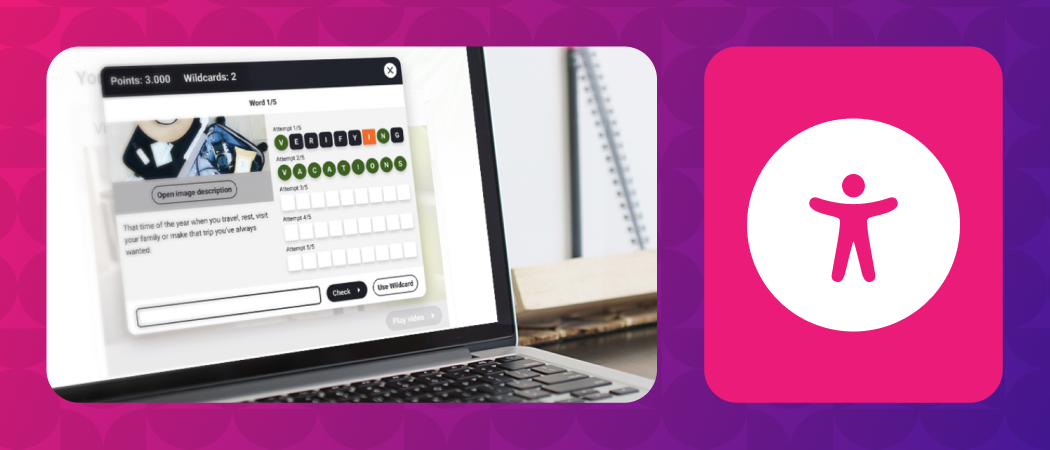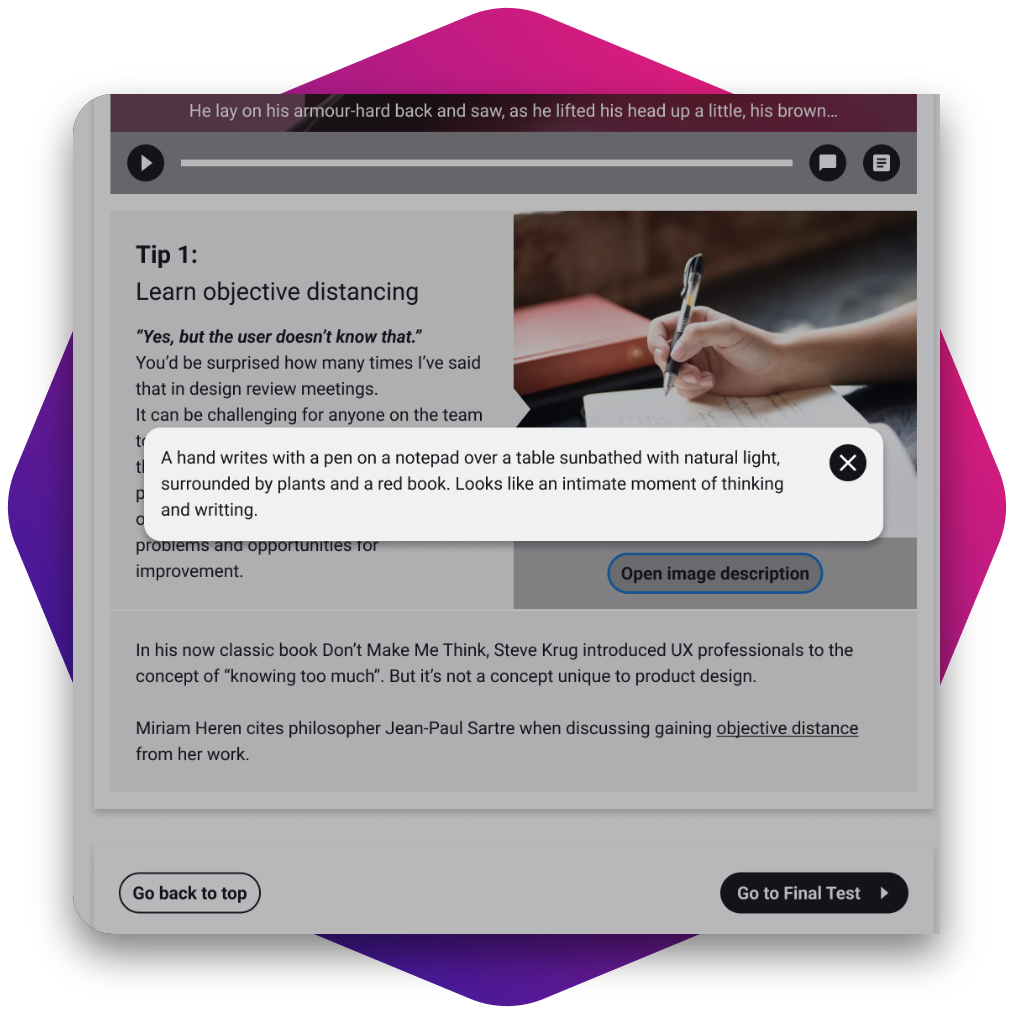Accessibility has an impact: 57% employees prefer inclusive companies
)
Did you know that almost all companies have employees with a permanent or temporary disability, or who are otherwise neurodivergent? It’s a fact that around 1.3 million people in the world have some type of disability – whether visual, auditory or intellectual – whilst between 15 to 20% of the world’s population has diagnosed neurodivergence. This last condition refers to people with either dyslexia, dyspraxia, or attention deficit hyperactivity disorder (ADHD), or those who register on the autism spectrum.
These numbers illustrate why it is so important for organisations to adapt their work environment to favour accessibility, as well as their digital tools and L&D processes. Doing so is the key to ensuring that all employees have the chance to grow with equal opportunities. Indeed, not only is accessibility a legal requirement, but also has a highly beneficial economic impact, attracting and retaining talent as well as improving the performance of workers in general. According to Harvard Business Review, diverse teams produce 60% better results, and make better decisions in 87% of situations.
In this context, Diversity, Equity and Inclusion (DEI) strategies have become a vital element of the business world. Their importance is driven even higher as society increasingly observes and challenges the impact of company activity on people. Thanks to DEI policies, the hiring of diverse groups has increased by 8%, and they continue to strive towards the goal of real, meaningful inclusion in the workplace. An indispensable part of this process is offering the same learning and training opportunities to all professionals.

What is the current state of accessibility in online training?
It may come as a surprise to you that, despite the undeniable value of training in boosting internal talent, only 20% of online programs are currently accessible. Despite this, regulations are increasingly requiring more strict compliance from companies with the Web Content Accessibility Guidelines (WCAG 2.1) and Section 508 of the US Workforce Rehabilitation Act. These criteria seek to ensure that everyone, regardless of physical or neurological ability, can use and understand specific learning technologies or training programs.
For companies such as isEazy, a provider of e-Learning tools for the corporate sector, the need to meet these criteria has led to the development of an authoring tool which is truly accessible. Its commitment: to provide companies with quality e-Learning content, and give them the means to produce their own courses without needing to be experts in accessibility.
Applying DEI strategies with a focus on making L&D content as accessible as possible brings many benefits. These benefits not only apply to individual employees, but also to the company as a whole, ultimately generating a much greater return than if such strategies were disregarded. Here are some of the main advantages:
- Improves ROI
According to Accenture's Getting to Equal: The Disability Inclusion Advantage report, companies that apply inclusivity strategies in their corporate practice are 36% more profitable than their competition, achieving higher net income.
- Facilitates talent retention
DEI strategies are also key to attracting and retaining talent, not only because companies can choose from a greater number of candidates, but because, according to Glassdoor, 57% of people actively look for companies that are committed to diversity.
- Enhances reputation
In data from the ONCE Foundation and Reputation Institute, companies that are seen as having a high level of labour and social inclusion policies enjoy a significant improvement in their corporate reputation, as well as in the quality of their commercial support. This adds up to a big boost for a company’s public presence – an important advantage in an increasingly competitive business world.

The challenges of accessible training and how to overcome them
The integration of DEI policies into online training has clear benefits, both for an organisation and for public opinion, but it also poses great challenges – particularly in terms of knowledge of accessibility standards and legislation. Whether you run a company, an educational institution, or any other type of organisation, very specific regulations must be followed when creating accessible e-Learning courses. In the case of the WCAG, a company that wishes to comply with their criteria must satisfy four key points. Content should be:
- Perceptible: Information and interactive components must be presented to users in such a way that they can clearly perceive them;
- Operable: Navigation of content and interactive elements must be fully operable, regardless of the device used to access them;
- Understandable: Any information presented to users, as well as their navigation through the content, must always be understandable;
- Robust: Content must be robust enough for anyone to use, including the use of assistive technologies.
However, simply knowing the details of the law does not necessarily mean that it is applied correctly – in fact, many organisations lack the technical capabilities to implement these criteria correctly. For this reason, it’s fairly common for the production of accessible content to be outsourced, which naturally ends up generating extra costs for the company. Alternatively, an organisation may attempt to create content internally using an authoring tool, although most are either too complex (or too simplistic) to really comply with accessibility standards.
This often means that, instead of creating genuinely accessible courses, organisations limit themselves to translating content into other formats – such as PDF – that do not respond 100% to the needs of students. Such formats also lack the interactivity and dynamism of a real e-Learning course. This fact sets these alternatives very far away from genuine accessibility, and above all from the DEI policies that more and more companies aspire to implement. In response to this problem, authoring tools have developed new features over the past year, with the aim of producing truly accessible content autonomously and intuitively.
This is the case with isEazy Author, which is equipped with powerful features and an intuitive interface, so you can create an interactive online course as well as an accessible version – automatically. Crucially, there’s no need to give up on interactives and games, as these key learning elements retained in an accessible form. Plus, the tool’s accessible authoring mode remains just as intuitive, offering tips and automations to help content creators streamline the whole process.
In short, accessibility, and the diversity, equity and inclusion policies that naturally accompany it, have become the engine of growth for companies that want to prove themselves competitive and sustainable over time. The future is in the hands of those businesses that make a firm commitment to these strategies, and strive to offer professional development under equal opportunities to all.
Miguel Valverde 


)
)
)
)
)
)
)
)
)
)
)
)
)
)
)
)
)
)
)
)
)
)
)
)
)
)
)
)
)
)
)